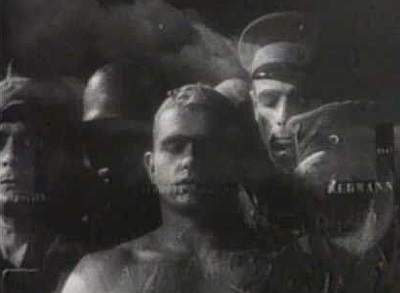Originally posted on 11/20/16
After a career spanning over 60 years, French filmmaker Abel Gance is perhaps best known for his groundbreaking silent epic NAPOLEON. But he's also remembered for another silent classic, the anti-war drama "J'Accuse" (1919), which no doubt helped him exorcise some of the emotional pain he still felt after the horrors of World War I.
With global war once again looming as the 1930s drew to a close, Gance decided to remake his film for a new generation who, it must've seemed to him, had forgotten the old horrors and were avidly stoking the flames of war again. The new J'ACCUSE (1938) is Gance with his heart on his sleeve, imploring all who see it to cling to peace over war by any and all means.
The film opens right in the middle of the kind of grueling, gritty battle whose bitter realism and almost palpable detail would later heavily influence such directors as Stanley Kubrick (PATHS OF GLORY) and Steven Spielberg (SAVING PRIVATE RYAN). Gance plunges us right into the mud and the crud and the blood as shells explode continuously all around and bodies flail helplessly along with the debris.
The intensely visual director doesn't shy away from blatant symbolism--a crucifix statue upended in a fountain where a white dove sinks lifelessly beneath the filthy water harkens back to Gance's silent film origins--but there's a sophistication and verisimilitude to these scenes of comrades under fire that makes their naked sentimentality all the more emotionally authentic.
Victor Francen is a stalwart presence as Jean Diaz, a seasoned soldier and the only survivor of a monthly ritual in which twelve men are chosen for a hazardous patrol in an area from which no one ever returns. When the next twelve are chosen, Diaz does all in his power to have the suicide patrol cancelled, and, failing this, takes the place of one of the men who is the father of four children.
Ironically, these men are among the last to die when war's end is declared soon after their departure. Again, Diaz is the only survivor--barely--and upon returning to France, the wounded veteran fulfulls a promise to help the widow and young daughter of one of the dead men. The man, it turns out, was his romantic rival, whose wife Edith (Line Noro) is the love of his life.
The middle section of the film settles into the story of how Jean copes with civilian life by withdrawing into solitude, his mental state in flux due in part to a head wound, and working in secret on a mysterious project that he hopes will end all war.
There's also a subplot in which a former officer in his squad, whom he feels didn't do enough to stop the final patrol, is now a businessman set to profit from the next impending world war by appropriating one of Jean's inventions. Strangely, by this time Jean is now in love with Edith's now-grown daughter Helene (Renée Devillers). But the prospect of the coming war eventually drives all other considerations from his mind.
(CAUTION: The next two paragraphs contain spoilers.)
When war is finally declared, the increasingly mad Jean makes his way out to a military cemetery and exhorts his fallen comrades, from every nation and branch of the service, to rise from the dead and march upon those among the living who would contemplate repeating the horrors of the past.
Here, Gance dispenses with conventional drama and pulls out all the stops to assail the viewer with one of the most bizarre, surrealistic sequences ever filmed. Storms roil the skies, crosses disappear into open graves, and crowds of people across Europe flee screaming as though Godzilla, or perhaps a horde of George Romero's zombies, is on their heels. The relentless parade of horrific imagery includes actual disfigured former soldiers among the walking dead, whose faces will haunt you.
The DVD from Olive Films is in 1.37:1 windowbox format with mono sound. Soundtrack is in French with English subtitles. No extras. Picture quality is good, with the kind of lush black-and-white photography that I relish.
As mentioned before, the early WWI scenes seem a direct influence on later war films, particularly Kubrick's PATHS OF GLORY. Gance intercuts these with actual war footage, which is jarring but effective. But nothing prepares us for the last ten minutes of so of J'ACCUSE, which suddenly turn this heartfelt plea for peace on Earth and goodwill to men into a pitch black, deathly morbid nightmare that heralds the real life horrors soon to come. Gance is clearly hoping that such cinematic extremes will change hearts and minds enough to avert further war in the real world; unfortunately, those people with sufficient empathy and compassion to be affected by such things are never the right people.




No comments:
Post a Comment